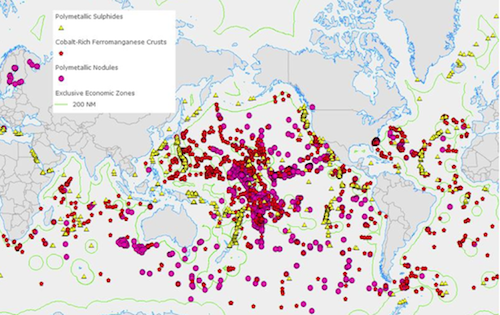The new frontier for mining is the bottom of the ocean. When done in relatively shallow waters (500m or less), it’s known as seabed mining (SBM); in areas where the seafloor is deeper, it’s called deep sea mining (DSM). In the past five years, the International Seabed Authority, a UN agency that oversees commercial activity in international waters, has issued 27 exploration licenses, each good for 15 years. So far, no mines are active in deep waters, but that’s likely to change soon:
If you’d like to get up to speed on what’s going on in the field, this resource page from the Ocean Foundation is a great place to start. It includes links to major agency, industry, and NGO players and to several reports of interest. Noise is considered a significant impact from SBM and DSM, though seafloor habitat disturbance (both physical disruption and the addition of light to areas normally very dark) and plumes of sediment in water being returned from the processing ship above are the primary impacts.
Mining at sea often has a much smaller social and ecological footprint than terrestrial mining; among other factors, many seabed mineral reserves have a higher concentration of the minerals of interest than those on land, especially after centuries of mining the best ores. Still, one common target for ocean mining is deep sea vents, which are biologically rich thanks to their concentration of minerals and temperature differentials. We’re still in the early years of grappling with how to assess the significance of the impacts on seafloor habitats. Moving forward, we need to be considering what proportion of each regional habitat type will be allowed to be disrupted, and, as ever, we should be particularly cautious about introducing industrial activity into areas that are still relatively free of other human activity (this is especially important in regards to noise). See previous AEI coverage of this issue here.


September 8th, 2015 at 11:50 pm
Please, stop the noise blasting activities that cause great harm to cetaceans and all marine life. Please be considerate of them in the decision making process.